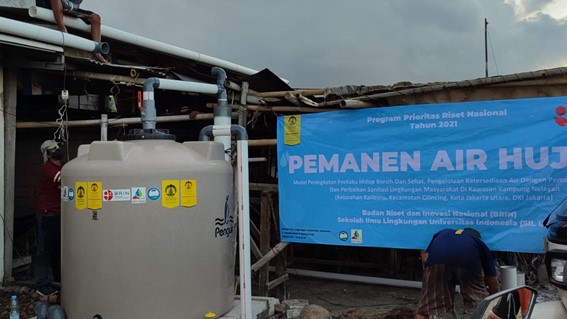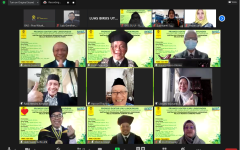Meeting the Clean Water Needs of the Kalibaru Fishing Village Community from the Rainwater Harvesting System
August 9, 2023 2024-12-21 17:17Meeting the Clean Water Needs of the Kalibaru Fishing Village Community from the Rainwater Harvesting System

Meeting the Clean Water Needs of the Kalibaru Fishing Village Community from the Rainwater Harvesting System
Water is a crucial resource, as it is the main support for human life. However, the risk of water crisis is starting to be experienced by a number of communities, especially coastal communities in big cities. Fulfillment of clean water is a major challenge, especially with environmental conditions that are starting to degrade.
The Rainwater Harvesting System (SPAH) is one of the efforts to fulfill clean water carried out by students of the School of Environmental Sciences, University of Indonesia in community service activities. This activity is in collaboration with the National Research and Innovation Agency (BRIN) and takes place in RW 01 and RW 15, Kalibaru Village, Cilincing District, North Jakarta.

Water is a crucial resource, as it is the main support for human life. However, the risk of water crisis is starting to be experienced by a number of communities, especially coastal communities in big cities. Fulfillment of clean water is a major challenge, especially with environmental conditions that are starting to degrade.
The Rainwater Harvesting System (SPAH) is one of the efforts to fulfill clean water carried out by students of the School of Environmental Sciences, University of Indonesia in community service activities. This activity is in collaboration with the National Research and Innovation Agency (BRIN) and takes place in RW 01 and RW 15, Kalibaru Village, Cilincing District, North Jakarta.

In terms of maintenance and care, SPAH can be carried out periodically depending on the rainy season. If there is little rainfall, it is necessary to clean the roof and check the condition of the dacron. Then, in the process of harvesting rainwater after the dry season, it is necessary to first drain the water for 15-20 minutes before collecting the water in the reservoir. This aims to clean the pipeline from debris on the roof.
SPAH can also be done individually on a household scale using the simplest tools and materials such as drinking water gallons, or buckets as rainwater collection containers.
SIL UI’s Pegmas activity in the Cilincing coastal area, apart from aiming to fulfill clean water needs, is also an effort to reduce stunting. This is because rainwater has abundant benefits such as for public health because it helps cell regeneration, reduces the cost of using water from other sources, and reduces the decline in groundwater levels.

“From this SPAH, it is hoped that it can increase the need for clean water for the fishing community in Kalibaru, it is also hoped that with enough clean water it can reduce the stunting rate in Kalibaru,” said Dr. Hayati Sari Hasibuan (December 22, 2021).
A healthy life starts from consuming proper water, with the process of harvesting rainwater can help improve health and also environmental sustainability.







